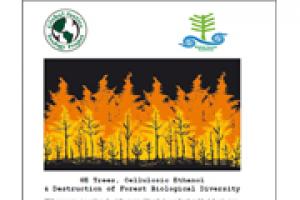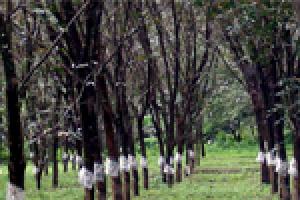A recent study published by WWF (1) analyzes deforestation and forest degradation in Riau Province between 1982 and 2007 and identifies their main drivers: pulpwood and oil palm industrial plantations.
The study shows that the fastest rate of deforestation in Indonesia is occurring in central Sumatra's Riau province, which used to have 78% of its land covered by forest. In the past 25 years, some 4.2m hectares (65%) of its tropical forests and peat swamps have been cleared for industrial plantations.
Large-Scale Tree Plantations
Industrial tree plantations are large-scale, intensively managed, even-aged monocultures, involving vast areas of fertile land under the control of plantation companies. Management of plantations involves the use of huge amounts of water as well as agrochemicals—which harm humans, and plants and animals in the plantations and surrounding areas.
Other information
28 April 2008
Other information
28 April 2008
Alan Garcia’s government is promoting a bill (draft law 840) also known as the “Forest Law.” It is a law concerning the promotion of private investment in reforestation and agro-forestry, whereby land with no forest cover in the Peruvian Amazon – erroneously classed as deforested wastelands, meaning there are no acquired rights over them – could be allocated, not as concessions, but as private property. This would open the door to major capital to establish large-scale tree plantations, under the guise of “reforestation.”
Other information
17 April 2008
Press Release - 17 April 2008, International Day of Peasant's Struggle.
Asunción, Paraguay
Other information
2 March 2008
The Pampas of Argentina and Uruguay is one of the largest uncultivated grasslands in the world. Grasses have dominated the Pampas for at least three thousand years. Starting in the 19th Century eucalyptus trees were planted on small areas, for shade on cattle ranches and for construction materials. Today, the pulp and paper industry and the carbon offsets industry are expanding their operations in South America. Increasingly, they are targeting grasslands for conversion to large-scale industrial tree plantations.
Other information
2 March 2008
Lake Chini is dying. The beautiful lake in the state of Pahang is one of the only two large natural freshwater bodies in Malaysia --and is dying. It used to teem with fish and other aquatic animals and plants and has been the home of indigenous communities, the Jakuns. Various human activities have contributed to the pollution of Lake Chini especially the establishment of a dam. However one contributing factor has been the pesticides and fertilisers used in the oil palm plantations fringing the lake and in many places next to the water.
Other information
25 February 2008
By Global Justice Ecology Project and Global Forest Coalition - February 2008.
With concerns mounting about the competition between food and fuel due to cropbased agrofuels, the cellulosic ethanol industry is heavily promoting fuel produced from woody sources such as trees as the solution to this conflict.
Other information
23 February 2008
By Ms Sayamol Kaiyoorawong and Ms Bandita Yangdee - Project for Ecological Awareness Building
Other information
15 February 2008
Commentary on CBD/SBSTTA/INF/6 Paper on Potential Impacts of GE Trees
Prepared for CBD SBSTTA Meeting, Rome, Italy, 18-22 February, 2008
This document is a joint commentary prepared by those organizations involved in the CBD process that are urging for clear moratorium on the open release of GE trees, and was written in response to the INF-6 background document, to highlight areas of particular relevance and to point out areas where information has not been included or considered.
Bulletin articles
2 February 2008
International Women’s day is around the corner and we would like to pay homage to the countless women struggling for their rights by sharing parts of a recent research (1) carried out by two women in Brazil which, on the one hand, provides a broad account of women’s struggles against plantations in that country and on the other hand provides testimonies from local women on how those plantations have impacted on their lives and livelihoods.
Other information
2 February 2008
Indonesia: Call for Action against certification of Riau Andalan Pulp and Paper’s timber plantations
The giant pulp company PT. Riau Andalan Pulp and Paper (PT. RAPP), operating in Riau Province, is applying for a Plantation Forest Management Certificate from the Indonesia Ecolabeling Institute (LEI) Certification System.
Riau-based NGOs and several regional and national NGOs are strongly challenging the application on several grounds including:
Bulletin articles
2 February 2008
Late last year, the Flanders Institute for Biotechnology (VIB), a life sciences research institution applied for permission to establish a field trial of genetically modified poplar trees in Belgium. The GM trees would have modified lignin content, aimed at making production of ethanol easier.
Other information
2 February 2008
Increased poverty, land conflicts and deforestation: The Asian Development Bank's plantations record
The ADB has handed out more than US$1 billion for forestry projects since its first forestry project in 1977. Most of the Bank's recent forestry projects were rated "partially successful or unsuccessful". The Bank acknowledges "problems with project design and implementation" and that "its [forestry] sector investments have had a minimal positive impact on forest loss and degradation". Even this "minimal positive impact" is a result of defining a plantation as a forest.




